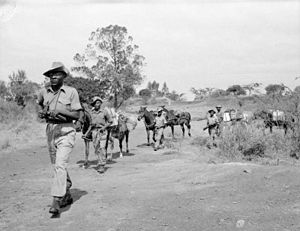Mau Mau rebellion
| Mau Mau Uprising | |||||||
|---|---|---|---|---|---|---|---|
 Troops of the King's African Rifles on watch for Mau Mau rebels. |
|||||||
|
|||||||
| Belligerents | |||||||
| Mau Mau rebels | |||||||
| Commanders and leaders | |||||||
|
Dedan Kimathi Musa Mwariama Waruhiu Itote Stanley Mathenge |
|
||||||
| Strength | |||||||
| Unknown | 10,000 regular troops 21,000 police 25,000 Kikuyu Home Guard |
||||||
| Casualties and losses | |||||||
|
Killed: 12,000 officially; perhaps 20,000+ unofficially Captured: 2,633 Surrendered: 2,714 |
Killed: 200 Wounded: 579 |
||||||
|
Civilian Victims of Mau Mau: Native Kenyans wounded: 916 South Asians killed: 26 South Asians wounded: 36 Europeans killed: 32 Europeans wounded: 26 |
|||||||
Civilian Victims of Mau Mau:
The Mau Mau Uprising, also known as the Mau Mau Rebellion, Mau Mau Revolt, or Kenya Emergency, was a military conflict that took place in British Kenya between 1952 and 1960. It involved Kikuyu-dominated groups summarily called Mau Mau, the white settlers, and elements of the British Army, including local Kenya Regiment, mostly consisting of the British, auxiliaries, and anti-Mau Mau Kikuyu.
The capture of rebel leader Dedan Kimathi on 21 October 1956 signalled the defeat of the Mau Mau, and ended the British military campaign. The Mau Mau failed to capture widespread public support, partly due to the British policy of divide and rule, and the movement remained internally divided, despite attempts to unify its various strands. The British, meanwhile, could draw upon their ongoing efforts to put down another rebellion in Malaya.
The uprising created a rift between the European colonial community in Kenya and the metropole, but also resulted in violent divisions within the Kikuyu community. The financial cost of the uprising to the former colony amounted to £55 million.
On 12 September 2015, the British government unveiled a Mau Mau memorial statue in Nairobi's Uhuru Park that it had funded "as a symbol of reconciliation between the British government, the Mau Mau, and all those who suffered". This followed a June 2013 decision by Britain to compensate more than 5,000 Kenyans it tortured and abused during the Mau Mau insurgency.
The origin of the term Mau Mau is uncertain. According to some members of Mau Mau, they never referred to themselves as such, instead preferring the military title Kenya Land and Freedom Army (KLFA). Some publications, such as Fred Majdalany's State of Emergency: The Full Story of Mau Mau, claim it was an anagram of Uma Uma (which means "get out get out") and was a military codeword based on a secret language-game Kikuyu boys used to play at the time of their circumcision. Majdalany goes on to state that the British simply used the name as a label for the Kikuyu ethnic community without assigning any specific definition.
...
Wikipedia
